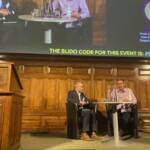Addressing the skills shortage while building data capability was a hot topic at last week’s Think Data for Government event in London.

Michael Horan, head of role for data engineering, data management and data governance at DWP Digital explained how the data space contains “hardcore” technical areas, such as data engineering and data architecture, but it also encompasses business rules, governance and data quality.
Horan’s remit is to build capability and capacity to support DWP’s data and corporate strategy.
“The importance from my side is to make sure that we have an organisation which is flexible, highly skilled and adaptable,” he said. “Business priorities change fairly regularly, [so] we need people who are able to switch between roles and move them to areas where the highest priority is on point. It’s all encompassing. And as we digitise more, it’s becoming more and more prevalent, a really important area.”
Fiona James, director data growth and operations and chief data officer at the Office for National Statistics (ONS) added that its focus is on building data capabilities across the organisation.
“The data strategy sets out a baseline level of skills that we expect everyone in ONS to have, regarding data capability and what I like to talk about a ‘state of dexterity’,” she explained. “Increasingly, we expect our analysts to be able to go out and work with data and understand metadata and putting that metadata into our systems in a way which enables us to more consistently join up and consistently structure and link that data. So we have a whole host of learning and training in place in the organisation to help both DDaT [Digital, Data and Technology] professionals and non-DDaT professionals develop data skills.”
If you liked this content…
James added that the ONS is looking to see how it can build on that strategy, of which a key element going forward will be around ethics, “and how we continue to make sure we’ve got trust and transparency as we move to some more admin-based data sources.”
Skills will adapt
As technology advances in areas like artificial intelligence (AI) and automation, skill sets will adapt accordingly, both Horan and James agreed.
“Automation now, but particularly in the next two years, for us, is going to be critical,” said James. “For example, we still have a team of clerical matches who are assessing the quality of data coming in from surveys and checking that we’re properly putting that into our systems. But one might expect in the next couple of years as we have more automatic algorithms, which enable us to match data more quickly, once those algorithms are trained properly, then we might see a reduction in that skill going forward.
“Automation engineers in digital services and technology are absolutely something we’re seeing a need for more of.”
James said there are “a lot of really exciting automation opportunities” for data architects at the ONS. This includes working on the organisation’s new analytical platform, the Integrated Data Service, and looking at speeding up the processes for data ingest supporting a move to the Google Cloud Platform.







